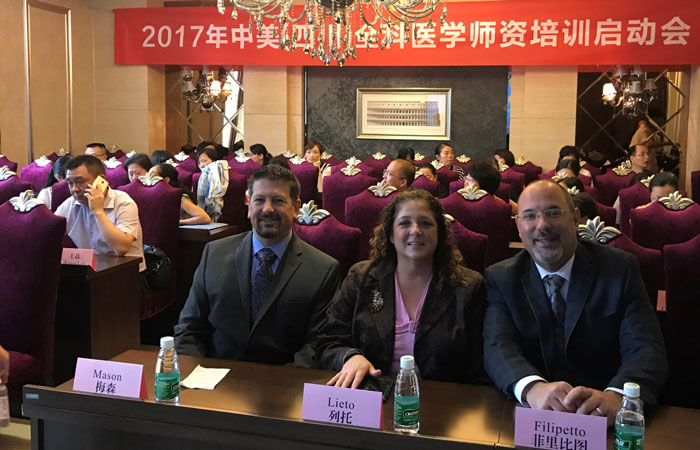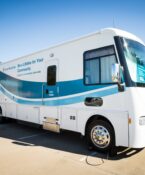Improving health care across the world
By Alex Branch

A trio of UNT Health Science Center faculty members shared their expertise in clinical care and patient communication this summer with physicians in China.
Frank Filipetto, DO, Janet Lieto, DO, and David Mason, DO, spent one week in Chengdu, a Chinese city in the Sichuan province, offering clinical instruction in pulmonary medicine while also demonstrating techniques to build relationships with patients that improve treatment compliance and outcomes.
“The physician-patient relationship there is more similar to what it was in the United States 40 years ago,” said Dr. Mason, Chair of the Department of Family Medicine and Osteopathic Manipulative Medicine. “Physicians just very directly tell the patient what they want to them to do. There is really no relationship or conversation.
“We tried to inspire them to listen to the patient. Review options together, explain them and choose the best treatment plan together.”
Team-based, patient-centered care is a hallmark of the Texas College of Osteopathic Medicine. The June trip was coordinated by the International Primary Care Educational Alliance, which advances global recognition of primary care medicine as the foundation of good health for all patients.
Prior to joining the Health Science Center, Dr. Filipetto, TCOM Senior Associate Dean, hosted in New Jersey a delegation of Chinese physicians who observed the training process for family medicine residents in the hope of expanding Family Medicine training in China.
In 2014, Dr. Filipetto and Dr. Mason visited cities in Sichuan to educate and guide Chinese colleagues who were transitioning to a primary care-based health care system. Dr. Filipetto said, “We are collaborating with our colleagues in China to bring to them what osteopathic training has offered the U.S. for the past century – patient-centered primary care.”
Dr. Lieto, who made her first trip to China in June, said she was struck by the many barriers Chinese physicians face in building relationships with patients. For example, the sheer volume of patients can often result in fragmented and uncoordinated care with over reliance on unnecessary and costly technologic testing.
During the visit, Dr. Lieto said she taught many of the same communication skills she teaches TCOM students. She conducted role-playing exercises and observed real patient encounters and offered feedback.
“We worked on the difference between a paternalistic and humanistic approach to the patient,” said Dr. Lieto, Assistant Professor of Geriatric Medicine. “By humanizing and showing empathy, the caregiver builds trust with the patient. That’s what seemed to be lacking in the interactions I saw.”
Observing Dr. Lieto conduct a clinical encounter with an elderly patient and her family was a unique experience for the Chinese colleagues, Dr. Filipetto said.
“They never encountered a patient physically hug a physician after an initial encounter,” he said. “That’s when we knew we made a difference.”
To have the biggest impact, the Health Science Center physicians not only trained Chinese physicians to communicate but also how to train other physicians on communication skills.
“We weren’t just teaching 50 doctors how to communicate with patients,” Dr. Mason said. “We wanted to train 50 doctors who will then each teach 50 or 100 doctors to communicate with patients. This is an important transition that will take time.”

![Uyen Sa Nguyen Scaled[58]](https://www.unthsc.edu/newsroom/wp-content/uploads/sites/16/Uyen-Sa-Nguyen-scaled58-145x175.jpg)



Social media